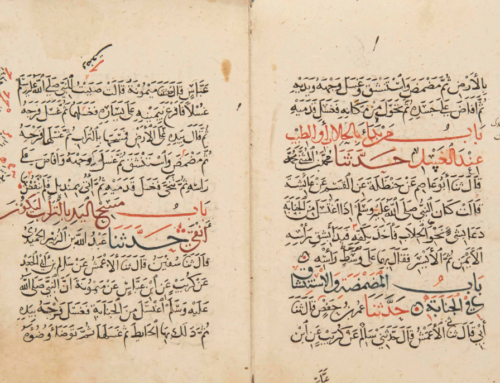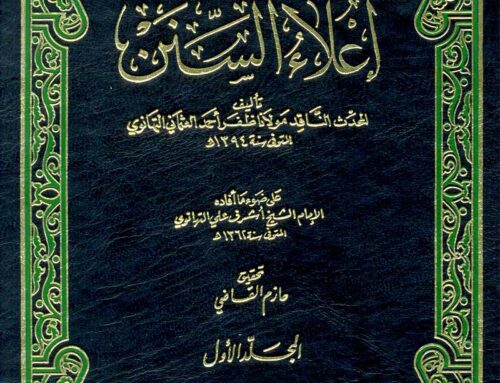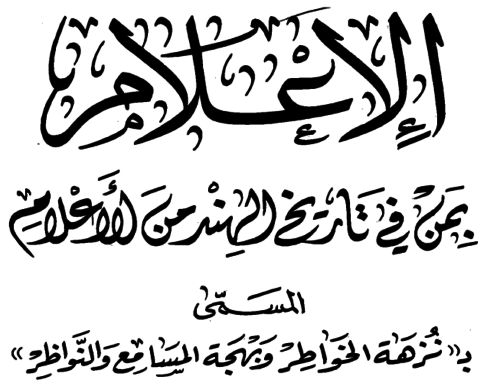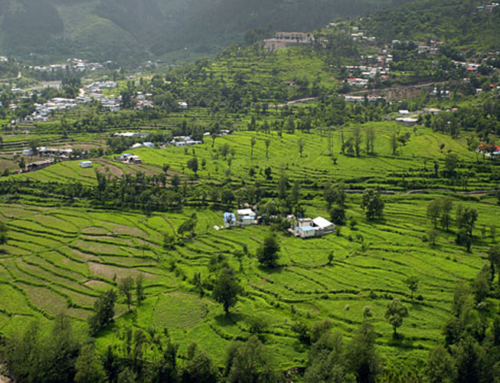By Muhammad Habib
Mawlana Muhammad Mazhar ibn Lutf ‘Ali ibn Muhammad Hasan al-Siddiqi al-Hanafi Nanautwi (1238-1302 AH /1823-1885) – the righteous imam, ‘arif (knower of Allah) and mujahid-was amongst the leading scholars of fiqh, hadith, and tasawwuf in his time.
A descendant of Sayyiduna Abu Bakr al-Siddiq (may Allah be pleased with him), he was born in Nanautah, a village in the district of Saharanpur (UP, India). He initially studied under his father with whom he completed the memorization of the Qur’an (hifz). He then travelled to Delhi, where he studied under Mufti Sadr al-Din Dehlawi, Mawlana Rashid al-Din Khan, the teacher of many shaykhs Mawlana Mamluk al-‘Ali Nanautwi, Mawlana Ahmad ‘Ali Saharanpuri and Shah ‘Abd al-Ghani Dehlawi. He studied some books of hadith from the renowned scholar of hadith Shah Muhammad Ishaq Dehlawi, the great grandson of Shah Wali Allah Dehlawi and successor of Shah ‘Abd al-‘Aziz Dehlawi.
After studying in Delhi, Mawlana Muhammad Mazhar Nanautwi occupied himself in correcting manuscripts (tas’hih) at the publishing house of Nawlkashur. Later he taught Islamic sciences at Ajmer College, and then at Agra College.
The Battle of Shamli
In 1273/1857, Mawlana Muhammad Mazhar fought against the British in the Battle of Shamli under the leadership of Haji Imdad Allah Muhajir Makki, alongside senior scholars such as Mawlana Rashid Ahmad Gangohi, Mawlana Qasim Nanautwi, Hafiz Zamin Shahid, Mawlana Rahmat Allah Kiranwi and his own younger brother Mawlana Muhammad Munir Nanautwi. It was in this battle that he sustained serious wounds.
Mufti Mahmud Hasan Gangohi relates:
”It was the habit of Mawlana Mazhar Nanautwi that he would often lick his upper lip. Someone once asked him the reason for this, but the respected Mawlana did not inform him. When this person insisted, Mawlana remarked, ‘When the battle against the British took place at Shamli, and the Muslims were being attacked, some of my comrades were dying and my leg was also hit by a bullet (due to which it became paralysed). In this state, I saw Hurs (damsels of Paradise) with glasses in their hands. The glasses were filled with a special type of drink that they were giving to those of my fallen comrades who were dying and had no chance of surviving. As this was happening, one of the damsels came towards me. She had just placed a glass against my mouth when another damsel took hold of her hands, pulled them away [from me] and said, ‘He is not among those who are to pass away.’ A very small amount of this drink fell on my upper lip, the [sweet] taste of which remains till today. This is why I have this habit [of licking my upper lip.]” [1]Malfuzat-e-Faqih al-Ummat (Karachi: Dar al-Huda, September 2005 ed.) Vol 3, p. 264-265 by Mufti Muhammad Faruq Mirathi.
After the battle was over, Mawlana Muhammad Mazhar went into hiding at Bareilly. Once a general amnesty was declared, he emerged from hiding and thereafter began teaching at his home.
Teaching the Islamic Sciences
Many students studied fiqh, usul al-fiqh (principles of Islamic law), kalam (scholastic theology), mantiq (classical logic), Arabic grammar and other related sciences from him.
In Shawwal 1283/February 1867, he was appointed headteacher at a madrasah founded in Saharanpur by Mawlana Sa’adat ‘Ali Saharanpuri, the well-known jurist (faqih), who was a participant of the 1273/1857 jihad and a devoted follower of Shah Ahmad ibn ‘Irfan Barelwi-the martyr of Balakot. [2]One of the greatest spiritual guides of the Indian sub-continent in the last few centuries. He is popularly known as Sayyid Ahmad Shahid. When this madrasah progressed and an exclusive building was established for it, it was named Mazahir ‘Ulum in Mawlana Muhammad Mazhar’s honour. He exerted his efforts in teaching the Qur’an and Sunnah (hadith), and in disseminating knowledge and the Islamic sciences. He was also involved with the administration of Mazahir ‘Ulum at every level and taught there until the end of his life. During his nineteen years at Mazahir ‘Ulum he taught all the six canonical collections of hadith as well Muwatta Imam Malik, Shama’il al-Tirmidhi and Sunan al-Darimi. He taught [from the] various renowned commentaries of the Qur’an as well as al-Durr al-Mukhtar and other famous works of Hanafi fiqh and usul al-Fiqh. He toiled hard to ensure that the madrasah maintained a high academic standard and he succeeded in doing so. This was acknowledged and appreciated by scholars associated with the madrasah, including Mawlana Rashid Ahmad Gangohi. It is testimony to the efforts and sincerity of Mawlana Muhammad Mazhar Nanautwi that after his death the consultative committee of Mazahir ‘Ulum were unable to find anyone of his calibre to replace him in his all-encompassing role at the madrasah.
He had many outstanding students; most prominent amongst them was the eminent hadith scholar Mawlana Khalil Ahmad Saharanpuri. [3]Mawlana Khalil Ahmad Saharanpuri’s love for his teacher can be gauged from the fact that when he became extremely ill in 1340/1922, he wrote in his will, ‘Bury me beside my teacher … Continue reading Hujjat al-Islam Mawlana Muhammad Qasim Nanautwi, founder of the renowned Islamic seminary, Dar al-‘Ulum Deoband, also studied some primary books [4]Mawlana Anwar al-Hasan Sherkoti writes in Anwar-e-Qasimi that Mawlana Muhammad Qasim Nanautwi studied Sharh Mi’ah ‘Amil, Hidayat al-Nahw, ‘Ilm al-Sighah and other books from Mawlana … Continue reading under his tutelage.
He also assisted in completing Ghayat al-Awtar, the Urdu translation of Imam ‘Ala’ al-Din al-Haskafi’s al-Durr al-Mukhtar, as stated in its introduction by Mawlana Muhammad Ahsan Nanautwi. [5]See Ghayat al-Awtar (Karachi: H M Sa’eed Company, 1398 AH ed.) Vol 1, p.10
From the legacy of Mawlana Muhammad Mazhar Nanautwi’ is the continuous chain of exceptional hadith scholars that have graduated from Mazahir ‘Ulum, which include and is not limited to the likes of:
- Mawlana Khalil Ahmad Saharanpuri
- ‘Allamah Zafar Ahmad ‘Uthmani
- Shaykh al-Hadith Mawlana Muhammad Zakariyya Kandhlawi
- Mawlana ‘Abd al-Rahman Kamilpuri
- Mawlana Muhammad Idris Kandhlawi
- Mawlana Ashfaq al-Rahman Kandhlawi
- Mawlana Muhammad Ayyub Saharanpuri
- Mawlana Muhammad Yusuf Kandhlawi
- Mawlana Badr-e-‘Alam Miruthi,
- Shaykh al-Hadith Mawlana Yunus Jonpuri.
His Characteristics and the Spiritual Path
He trod the path of tasawwuf under the guidance of Shaykh al-Sunnah Mawlana Rashid Ahmad Gangohi, who granted him permission (ijazah) to initiate others into the path. This despite him being older than his beloved shaykh.
Mawlana Qari Muhammad Tayyib Qasimi relates from his father, Mawlana Muhammad Ahmad Qasimi:
”Mawlana Muhammad Mazhar Nanautwi once saw Mawlana Rashid Ahmad Gangohi and Mawlana Qasim Nanautwi in a dream, sitting on a throne. Mawlana (who was older than the two shaykhs) relayed the dream in a letter to Haji Imdad Allah in which he also requested him to accept his bay’ah (pledge of spiritual purification). In reply, Haji Imdad Allah interpreted the dream by instructing him to give bay’ah to either one of the two [shaykhs]. Therefore, Mawlana Muhammad Mazhar brought the letter to Mawlana Qasim Nanautwi and requested him to accept his bay’ah. Embarrassed, Mawlana Qasim Nanautwi replied, ‘Accept my bay’ah instead!’ Mawlana Muhammad Mazhar remarked, ‘Here, this is the letter [of Haji Imdad Allah] and this is the instruction.’ Mawlana Qasim Nanautwi then said, ‘Let me give you some sound advice. Proceed to Gangoh.’ Mawlana Muhammad Mazhar went there. At first, Mawlana Rashid Ahmad Gangohi also declined. He, however, later accepted bay’ah.” [6]Arwah-e-Thalathah, also known as Hikayat-e-Awliya’ (Karachi: Darul Isha’at, December 2001 ed.) p. 227-228.
Mawlana Rashid Ahmad Gangohi would express his embarrassment at the love, respect and veneration afforded him by Mawlana Muhammad Mazhar Nanautwi. Mawlana Muhammad Mazhar Nanautwi was a person of great insight (basirat). The respect he showed his shaykh due to his eminence and lofty rank, and the love he felt for him, was natural for him as a disciple. However, Mawlana Rashid Ahmad Gangohi was unable to disregard his disciple’s seniority in age and felt obliged to act according to the blessed words of the Messenger of Allah (may Allah bless him and grant him peace), ”He who does not have mercy on our young, and does not respect our elders is not of us.” (Tirmidhi)
Mawlana Muhammad Mazhar Nanautwi was also granted ijazah in tasawwuf by Shaykh al-‘Ulama’ Haji Imdad Allah Muhajir Makki, in whose heart he held a special place, as indicated in his letters (maktubat).
Mawlana Muhammad Mazhar Nanautwi was from amongst the ascetic and righteous ‘ulama’; he would be referred to in matters of fiqh. He was an erudite scholar of the rational (ma’qul), literary (lughawi), and Islamic sciences, who embodied Shari’ah and Tariqah. He would habitually use perfume when reciting the Qur’an in tarawih prayers. He would refrain from affectation (takalluf) and was an awe-inspiring person; very few people would have the courage to speak in his presence. He was known for his simplicity, humbleness, piety, intelligence and wisdom.
Mawlana Sayyid Abu ‘l-Hasan ‘Ali Nadwi wrote of him:
”He was a scholar of deep learning, who had mastery over the [Islamic] sciences. He gave bay’ah to Imam Rashid Ahmad ibn Hidayat Ahmad Gangohi, who granted him ijazah. He would recite the Qur’an often, would be constantly engaged in the remembrance of Allah, and his tongue would remain moist with [the utterance of] Ism al-Dhat (Allah). He remained aloof from affectation, was an ascetic of an austere nature, dignified and was awe-inspiring.” [7]Al-I’lam bi man fi Tarikh al-Hind min al-A’lam also known as Nuzhat al-Khawatir (Idara Ta’lifat-e-Ashrafia, 1413/1993) Vol 7, p. 480 by Mawlana ‘Abd al-Hayy al-Hasani Nadwi … Continue reading
Shaykh al-Hadith Mawlana Muhammad Zakariyya writes in Tarikh-e-Mazahir-e-‘Ulum (History of Mazahir ‘Ulum):
”Mawlana Mazhar Nanautwi had very close relationships with Mawlana Muhammad Qasim Nanautwi and Mawlana Rashid Ahmad Gangohi. Despite being senior in age to Mawlana Gangohi, he was from amongst his deputies (khalifahs) and beloved servants. In fact he was an ardent lover of Mawlana Rashid Ahmad Gangohi and was extremely devoted to him. He had great understanding of fiqh and hadith. He was an Allah-fearing, pious, soft-natured and virtuous saint.” [8]Akabir ‘Ulama’-e-Deoband (Lahore: Idara Islamiat, Ramadhan 1419/January 1999 ed.) p.37-38 by Hafiz Sayyid Muhammad Akbar Shah Bukhari.
Journeys on Hajj
His first Hajj, in which Mawlana Qasim Nanautwi and Mawlana Ya’qub Nanautwi accompanied him, was performed in 1277/1861. He performed his second Hajj in 1294/1877 in the company of his shaykh Mawlana Rashid Ahmad Gangohi, Mawlana Qasim Nanautwi, Mawlana Ya’qub Nanautwi, Mawlana Shah Rafi’ al-Din, Shaykh al-Hind Mawlana Mahmud al-Hasan and others.
Famous Brothers
He had two brothers, both younger than him, who were accomplished scholars.
The elder of the two, Mawlana Muhammad Ahsan Nanautwi, was a prominent Hanafi jurist who translated a number of classical works in Urdu. In contrast to his brothers, elders and companions, Mawlana Muhammad Ahsan Nanautwi actively opposed the jihad of 1273/1857. Due to this, under duress of the local populace, he was forced to leave Bareilly, his town of residence. He returned later, after the battle had ended. There, aided by his two brothers, Mawlana Muhammad Mazhar and Mawlana Muhammad Munir, he established a publishing house called Matba’-e-Siddiqiyyah. [9]See footnote in ‘Ulama’-e-Hind ka Shandar Madi (Karachi: Maktabah Rashidia, 1406/1986 ed.) p.306 by Mawlana Sayyid Muhammad Miyan. A number of brilliant works were published from there, including
- A critical edition of Qadi ‘Iyad al-Maliki’s Al-Shifa’
- Mawlana Muhammad Qasim Nanautwi’s Tahdhir al-Nas
- Various works of Hakim al-Islam Shah Wali Allah al-Dehlawi.
Mawlana Muhammad Ahsan Nanautwi’s translations include:
- Imam Ghazali’s Ihya’ ‘Ulum al-Din
- Imam Ibn al-Qayyim al-Jawziyyah’s Ighathat al-Luhfan
- Shah Wali Allah Dehlawi’s Al-Insaf fi Bayan Sabab al-Ikhtilaf and Al-‘Iqd al-Jid fi Ahkam al-Ijtihad wa ‘l-Taqlid.
He translated and annotated:
- Imam Abu ‘l-Barakat ‘Abd Allah ibn Ahmad al-Nasafi’s Kanz al-Daqa’iq
- The latter part of ‘Allamah al-Haskafi’s al-Durr al-Mukhtar.
He also annotated the following works of Shah Wali Allah Dehlawi:
- Qurrat al-‘Aynayn fi Tafdil al-Shaykhayn
- Izalat al-Khafa’ ‘an Khilafat al-Khulafa’
- His Magnus opus Hujjat Allah al-Balighah.
He also collated the juridical edicts (fatwas) of Shah ‘Abd al-‘Aziz Dehlawi.
Mawlana Muhammad Ahsan was wrongly and unjustly declared an unbeliever by some ‘ulama of Bareilly [10]Mawlana Naqi ‘Ali Khan, father of Mawlana Ahmad Ridha Khan, in particular when he attested to a verdict of the famed scholar ‘Allamah ‘Abd al-Hayy Lucknowi, in which the latter had authenticated the narration of Sayyiduna ‘Abd Allah Ibn ‘Abbas (may Allah be pleased with him) regarding the creation of seven Earths and the existence of Prophets on each of them. [11] See Sawanih ‘Ulama’-e-Deoband (Deoband: Nawaz Publications, Jan 2000 ed.), Vol 1, p. 529-534 for details.
His teachers included Mawlana Mamluk al-‘Ali Nanautwi, Mawlana Ahmad ‘Ali Saharanpuri and the renowned hadith scholar Shah ‘Abd al-Ghani Dehlawi, from whom he also received ijazah in tasawwuf. Luminaries with whom he enjoyed close relationships included:
- Shah ‘Abd al-Ghani Dehlawi
- Haji Imdad Allah Muhajir Makki
- Mawlana Ahmad ‘Ali Saharanpuri
- Mawlana Rashid Ahmad Gangohi
- Mawlana Muhammad Qasim Nanautwi
- Mawlana Nur al-Hasan Kandhlawi
- ‘Allamah ‘Abd al-Hayy Lucknowi
- Mawlana Muhammad Husayn Muradabadi
- Shaykh Nihal Ahmad Deobandi
- Mawlana Fayd al-Hasan Saharanpuri.
He lies buried in the Qasimi cemetery in Deoband alongside Mawlana Dhu ‘l-Fiqar ‘Ali, father of Shaykh al-Hind Mawlana Mahmud Hasan Deobandi.
The youngest brother, Mawlana Muhammad Munir Nanautwi, was a student of Mawlana Mamluk al-‘Ali Nanautwi, Mufti Sadr al-Din Dehlawi and Shah ‘Abd al-Ghani Dehlawi. He served as a principal of Dar al-‘Ulum Deoband for a short period upon the request of Mawlana Rashid Ahmad Gangohi. He also actively fought alongside senior ‘ulama’ in the battle of Shamli in 1273/1857. He was heavily involved with Mawlana Muhammad Ahsan’s publishing house, Matba’-e-Siddiqiyyah. His academic works include an Urdu translation of Imam Ghazali’s Minhaj al-‘Abidin. He had a very close relationship with Mawlana Muhammad Qasim Nanautwi and was particularly known for his knowledge, piety, honesty and integrity.
Final Illness and Death
Mawlana Muhammad Mazhar Nanautwi endured pain in his kidneys for a number of years and passed away at the age of sixty-four (Islamic years) after Maghrib prayers on the evening of Monday 24th Dhu ‘l-Hijjah 1302/October 1885. During his final illness, he would often touch his forehead searching for traces of sweat, as according to the Prophetic hadith it is a sign of a believer’s death. When his death was near and he began sweating from his forehead, his face lit up with joy. He was not survived by any children.
May Allah enlighten his resting place. May Allah shower His mercy upon him and grant him, his teachers and students the highest stations in Paradise. Amin.
Adapted from Al-I’lam bi man fi Tarikh al-Hind min al-A’lam (also known as Nuzhat al-Khawatir), Akabir ‘Ulama’-e-Deoband, Hadrat Mawlana Rashid Ahmad Gangohi awr unke Khulafa’, Awjaz al-Masalik ila Muwatta al-Imam Malik, Tadhkirat al-Rashid, Tarikh-e-Dar al-‘Ulum Deoband and other sources.
| ↑1 | Malfuzat-e-Faqih al-Ummat (Karachi: Dar al-Huda, September 2005 ed.) Vol 3, p. 264-265 by Mufti Muhammad Faruq Mirathi. |
|---|---|
| ↑2 | One of the greatest spiritual guides of the Indian sub-continent in the last few centuries. He is popularly known as Sayyid Ahmad Shahid. |
| ↑3 | Mawlana Khalil Ahmad Saharanpuri’s love for his teacher can be gauged from the fact that when he became extremely ill in 1340/1922, he wrote in his will, ‘Bury me beside my teacher Mawlana Muhammad Mazhar Nanautwi.’ (See Sawanih ‘Ulama’-e-Deoband (Deoband: Nawaz Publications, Jan 2000 ed.), Vol 1, p. 502-503) |
| ↑4 | Mawlana Anwar al-Hasan Sherkoti writes in Anwar-e-Qasimi that Mawlana Muhammad Qasim Nanautwi studied Sharh Mi’ah ‘Amil, Hidayat al-Nahw, ‘Ilm al-Sighah and other books from Mawlana Muhammad Mazhar Nanautwi. (See Sawanih ‘Ulama’-e-Deoband (Deoband: Nawaz Publications) Vol 1, p. 501) |
| ↑5 | See Ghayat al-Awtar (Karachi: H M Sa’eed Company, 1398 AH ed.) Vol 1, p.10 |
| ↑6 | Arwah-e-Thalathah, also known as Hikayat-e-Awliya’ (Karachi: Darul Isha’at, December 2001 ed.) p. 227-228. |
| ↑7 | Al-I’lam bi man fi Tarikh al-Hind min al-A’lam also known as Nuzhat al-Khawatir (Idara Ta’lifat-e-Ashrafia, 1413/1993) Vol 7, p. 480 by Mawlana ‘Abd al-Hayy al-Hasani Nadwi and Mawlana Abu ‘l-Hasan ‘Ali Nadwi. |
| ↑8 | Akabir ‘Ulama’-e-Deoband (Lahore: Idara Islamiat, Ramadhan 1419/January 1999 ed.) p.37-38 by Hafiz Sayyid Muhammad Akbar Shah Bukhari. |
| ↑9 | See footnote in ‘Ulama’-e-Hind ka Shandar Madi (Karachi: Maktabah Rashidia, 1406/1986 ed.) p.306 by Mawlana Sayyid Muhammad Miyan. |
| ↑10 | Mawlana Naqi ‘Ali Khan, father of Mawlana Ahmad Ridha Khan, in particular |
| ↑11 | See Sawanih ‘Ulama’-e-Deoband (Deoband: Nawaz Publications, Jan 2000 ed.), Vol 1, p. 529-534 for details. |





